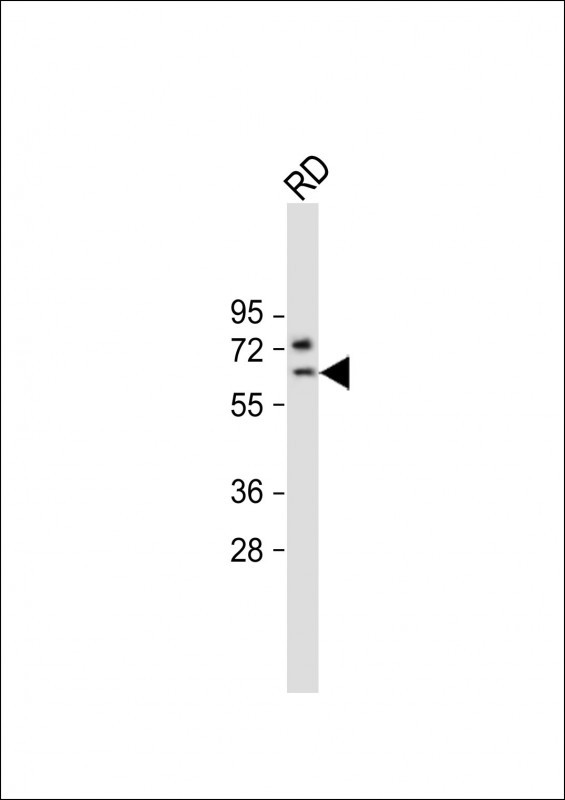
| WB | 咨询技术 | Human,Mouse,Rat |
| IF | 咨询技术 | Human,Mouse,Rat |
| IHC | 咨询技术 | Human,Mouse,Rat |
| ICC | 技术咨询 | Human,Mouse,Rat |
| FCM | 咨询技术 | Human,Mouse,Rat |
| Elisa | 咨询技术 | Human,Mouse,Rat |
| Aliases | Smoothelin-like protein 1, SMTNL1 |
| Entrez GeneID | 219537 |
| WB Predicted band size | 53.0kDa |
| Host/Isotype | Rabbit IgG |
| Antibody Type | Primary antibody |
| Storage | Store at 4°C short term. Aliquot and store at -20°C long term. Avoid freeze/thaw cycles. |
| Species Reactivity | Human |
| Immunogen | This SMTNL1 antibody is generated from rabbits immunized with a KLH conjugated synthetic peptide between 130-159 amino acids from the Central region of human SMTNL1. |
| Formulation | Purified antibody in PBS with 0.05% sodium azide. |
+ +
以下是关于SMTNL1抗体的3篇代表性文献及其摘要内容:
1. **文献名称**: "Smoothelin-like 1 protein is a bifunctional regulator of mammary epithelial cell proliferation and motility"
**作者**: Zhu L, et al.
**摘要**: 该研究利用自制的SMTNL1多克隆抗体,通过免疫印迹和免疫荧光技术,发现SMTNL1在乳腺癌细胞中通过调控RhoA/ROCK通路抑制细胞迁移,同时影响细胞周期蛋白表达,提示其在肿瘤进展中的双重作用。
2. **文献名称**: "SMTNL1 modulates vascular smooth muscle contractile responses via the PPARγ–RhoA signaling axis"
**作者**: Wooldridge AA, et al.
**摘要**: 研究通过制备兔源多克隆SMTNL1抗体,证实其在血管平滑肌中与过氧化物酶体增殖物激活受体γ(PPARγ)互作,调控RhoA活性,从而影响血管收缩功能,为高血压治疗提供新靶点。
3. **文献名称**: "Characterization of a novel monoclonal antibody against human SMTNL1 for colorectal cancer diagnostics"
**作者**: Kim HJ, et al.
**摘要**: 该团队开发了一种高特异性小鼠单克隆SMTNL1抗体,应用于结直肠癌组织芯片分析,显示SMTNL1表达与肿瘤分期呈负相关,提示其作为预后生物标志物的潜力。
---
**注**:若需获取具体文献,建议通过PubMed或ResearchGate以标题及作者姓名为关键词检索全文。部分研究可能需结合抗体应用场景进一步筛选。
SMTNL1 (Smoothelin-like protein 1) is a cytoskeleton-associated protein predominantly expressed in smooth muscle tissues, including those in the gastrointestinal tract, uterus, and blood vessels. It shares homology with smoothelin, a marker of differentiated smooth muscle cells, and is implicated in regulating contractile function through interactions with signaling pathways like RhoA/ROCK and calcium-dependent mechanisms. SMTNL1 modulates myosin phosphatase activity, influencing smooth muscle relaxation and contraction dynamics. Its expression is hormonally regulated, particularly by estrogen, linking it to reproductive and vascular physiology.
Antibodies targeting SMTNL1 are essential tools for studying its localization, expression levels, and functional roles in both physiological and pathological contexts. For instance, altered SMTNL1 levels have been observed in conditions such as hypertension, colorectal cancer metastasis, and uterine disorders. These antibodies enable techniques like Western blotting, immunohistochemistry, and immunofluorescence, aiding research into SMTNL1's involvement in cell motility, cytoskeletal organization, and disease progression. Commercial SMTNL1 antibodies are typically validated for specificity across human, mouse, and rat models, supporting translational studies. Ongoing research focuses on its potential as a therapeutic target or biomarker for smooth muscle-related diseases.
×